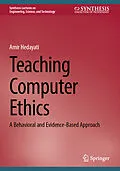With the growing use of AI and the introduction of large language models, such as ChatGPT, conversations about ethics have become commonplace. For many, this is the first time they have meaningfully considered the ethical and unethical use of technology in various settings, including education and the workplace.
This book reviews the history, nature, and complexity of computer ethics. It discusses the importance of computing ethics education, the process of ethical decision-making among computer science students, as well as misconceptions and biases that impact ethical decision-making.
Autorentext
Amir Hedayati, Ph.D., is Associate Professor of Organization, Information & Learning Sciences at the University of New Mexico. His research focuses on ethical decision-making among professionals, workplace inequalities, and ways to foster environments that promote moral and inclusive practices. Hedayati received his Ph.D. in Human Resource Development from the University of Illinois at Urbana-Champaign. He holds a B.Sc. in Computer Engineering and a Master of Business Administration.
Hedayati 's work has been recognized by various conferences, including the Ethics Division of the American Society for Engineering Education (ASEE), the Distance Learning Division of the Association for Educational Communications and Technology (AECT), and the Academy of Human Resource Development. In addition to his research and teaching, Hedayati has served as an evaluator for several higher education programs.
